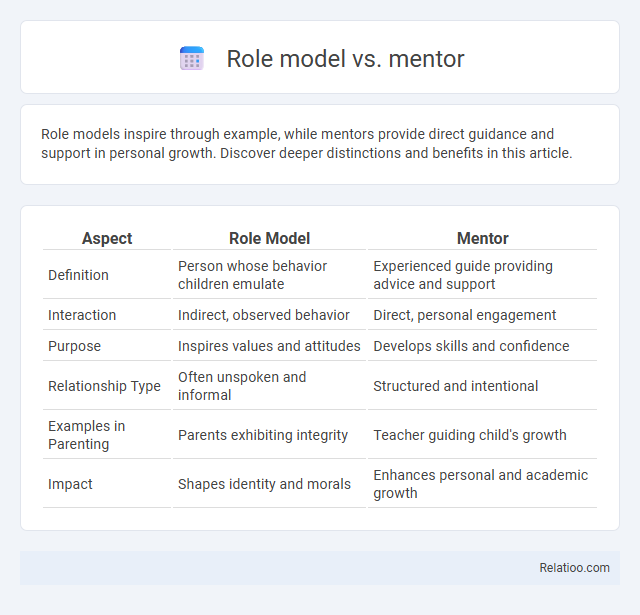Role models inspire through example, while mentors provide direct guidance and support in personal growth. Discover deeper distinctions and benefits in this article.
Table of Comparison
| Aspect | Role Model | Mentor |
|---|---|---|
| Definition | Person whose behavior children emulate | Experienced guide providing advice and support |
| Interaction | Indirect, observed behavior | Direct, personal engagement |
| Purpose | Inspires values and attitudes | Develops skills and confidence |
| Relationship Type | Often unspoken and informal | Structured and intentional |
| Examples in Parenting | Parents exhibiting integrity | Teacher guiding child's growth |
| Impact | Shapes identity and morals | Enhances personal and academic growth |
Defining Role Models and Mentors
Role models exemplify behaviors and qualities that inspire you through their actions and achievements, often influencing your values subconsciously. Mentors engage actively in your growth by providing guidance, advice, and support based on their experience and expertise. Understanding the distinction clarifies how role modeling shapes attitudes passively while mentoring involves intentional development.
Key Differences Between Role Models and Mentors
Role models inspire through their actions and achievements, serving as examples you aspire to emulate, while mentors provide personalized guidance, support, and feedback to help you develop specific skills and navigate challenges. Role modeling is the process of demonstrating behaviors and values that influence others indirectly, whereas mentorship involves a direct, interactive relationship focused on your growth and development. Understanding these distinctions helps you choose whether to observe from afar or engage in a collaborative learning experience with a mentor.
Characteristics of an Effective Role Model
Effective role models demonstrate integrity, consistency, and empathy, inspiring others by embodying the values they promote through their behavior. Unlike mentors who provide guidance and direct support, role models influence through example, shaping your attitudes and actions subconsciously. Role modeling cultivates positive traits and resilience, encouraging personal growth and ethical decision-making.
Qualities of a Successful Mentor
A successful mentor demonstrates empathy, active listening, and personalized guidance tailored to the mentee's goals and challenges. Unlike role models who inspire through example alone, mentors engage interactively, providing constructive feedback and fostering growth through trust and consistency. Effective mentoring also involves patience, expertise, and the ability to motivate, making mentors pivotal in professional and personal development.
Influence Scope: Role Model vs. Mentor
A role model exerts broad influence by embodying values and behaviors that inspire others across various life contexts, while a mentor provides targeted guidance and support through personalized, direct interaction. The influence scope of a role model is often indirect and widespread, impacting a larger audience through example and reputation. In contrast, a mentor's influence is intimate and specific, fostering growth and development within a defined relationship.
Relationship Dynamics in Mentoring and Role Modeling
Role models provide implicit guidance through observed behaviors, establishing aspirational benchmarks without direct interaction, while mentors engage in explicit, personalized guidance, fostering mutual trust and open communication. Role modeling emphasizes the influence of consistent behavior patterns that shape mentees' values and skills, whereas mentoring involves dynamic relational exchanges aimed at professional and personal growth. Understanding the distinct relationship dynamics clarifies how role models inspire from a distance, and mentors actively support development through interactive dialogue and feedback.
Impact on Personal and Professional Development
Role models inspire Your personal and professional growth by exemplifying qualities and behaviors worth emulating, often without direct interaction. Mentors actively guide, support, and provide feedback, accelerating skill development and career advancement through personalized advice. Role modeling shapes Your mindset and habits subtly over time, influencing decision-making and fostering continuous improvement in both personal and professional spheres.
How to Choose Between a Role Model and a Mentor
Choosing between a role model and a mentor depends on your specific developmental needs and goals; a role model provides inspiration through their achievements and behaviors, while a mentor offers personalized guidance, feedback, and support for skill development. Evaluate whether you need observational learning and motivation from a role model, such as a successful industry leader, or interactive, tailored advice from a mentor who understands your career path. Prioritize clarity on your objectives and the type of relationship that can best facilitate growth when deciding between emulating a role model and engaging with a mentor.
Real-Life Examples: Role Models vs. Mentors
Role models inspire by example, demonstrating qualities like resilience or leadership through their actions, such as Malala Yousafzai's advocacy for education. Mentors provide personalized guidance and support, exemplified by Steve Jobs mentoring Mark Zuckerberg to navigate challenges in the tech industry. Role modeling involves consistently exhibiting behaviors and values that others aspire to emulate, reinforcing lessons through observable action in daily life.
Integrating Both for Optimal Growth
Role models provide inspirational examples of behavior and success, while mentors offer personalized guidance and feedback tailored to individual growth. Integrating role modeling with active mentorship creates a dynamic environment where learners can observe desired traits and receive practical advice to apply those traits effectively. This combination maximizes personal and professional development by aligning aspirational goals with actionable strategies.

Infographic: Role model vs Mentor
 relatioo.com
relatioo.com